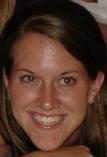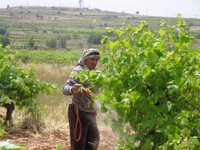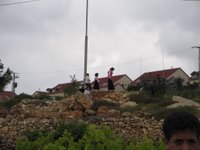In the Image of God
I’ve been with the CPT delegation for the past few days. We spent time with organizations and individuals in Jerusalem and Bethlehem. Now we're back in Hebron. We're learning and seeing a lot, and meeting many beautiful people. A common theme in our meetings seems to have been what it means to be fully human. And who do we consider fully human? Do we limit our definition of humanity to those like us?
We began the delegation on Friday May 26 with a visit to Yad Vasham, the Holocaust museum in Jerusalem. Stumbling through the immense suffering, one is left somewhat numb- confessing the blood that is on the Chruch’s hands- that is on my hands. The Church desecrated God’s image by actively and passively contributing to the torture and death of millions of Jews.
... And we continue to desecrate God’s image by actively and passively contributing to the suffering in the world.
 Friday afternoon we met with Rabbi Arik Ascherman from Rabbis for Human Rights. He works tirelessly to uphold the human rights of Israelis and Palestinians. His work is based in the belief that “God created humankind in God’s image.” Rabbi Ascherman believes that it is not ok to demolish Palestinian homes. It is not ok that Palestinian teachers and children are detained on their way to school It is not ok that Palestinians are refused basic human rights. He works from faith in a just God who created people to live together justly.
Friday afternoon we met with Rabbi Arik Ascherman from Rabbis for Human Rights. He works tirelessly to uphold the human rights of Israelis and Palestinians. His work is based in the belief that “God created humankind in God’s image.” Rabbi Ascherman believes that it is not ok to demolish Palestinian homes. It is not ok that Palestinian teachers and children are detained on their way to school It is not ok that Palestinians are refused basic human rights. He works from faith in a just God who created people to live together justly.
Here is a picture of a demolished Palestinian home outside of Jerusalem.
On Sunday we talked with Mordecai Vanunu. Mordecai spent 18 years in prison for revealing to the world Israel’s nuclear program. Mordecai left Israel in order to release this information. However, the Israeli government tricked him into flying to Italy and then kidnapped Mordecai and brought him back to Israel in order to imprison him. Most of his imprisonment was spent in solitary confinement. The Israeli prison guards tried to psychologically torment him. I asked how he survived the psychological torture and retained his humanity. Though they kept him from speaking to people, he sang loudly, he read out loud, and he prayed. Technically, Mordecai has been out of prison for 2 years. Yet, he remains imprisoned in the state of Israel. He is not allowed to leave the country. Upon his release he released his anger in prayer and in church services- never in violence. He said that violence is what the government wants- the prisons seek to diminish the humanity of those captive. According to Mordecai, suicide bombings and other violent acts fuel more racist policies. The government wants to push dissenters to dehumanizing violence. Yet, Mordecai said that he survived and continues to survive by not giving in to that dehumanization, by resisting the tormentors attempts to marr the free image of God in which he was created.
Sunday night we spoke with two men from Parent’s Circle, a joint Israeli/Palestinian bereavement group. Rami, the son of a Holocaust survivor, spoke first. He began by saying, “I am a Jew. I am an Israeli. I am a human being.” Like almost all Israelis, Rami served in the Israeli military as a teenager. He was very angry after his military service and he got out of the army. Following the army, Rami married and had 3 sons and 1 daughter. On September 1, 1997, 2 Palestinian suicide bombers killed 5 people, including his 14 year old daughter. In his tradition, there are 7 days of mourning with family and friends. He said, “On the 8th day everyone goes home and you have to face yourself. What are you going to do now? There are 2 options: 1) When someone kills your 14 year old daughter you are so angry and want to get even, but we are people so we can use our head & when I asked, ‘Will killing someone else bring back my baby?’… of course not. The other response is 2) to ask: ‘what would make someone so angry that he would kill a little girl? And another option is to ask what you can do to prevent this pain from happening to another.” Rami has come to the conclusion that hate and violence are not ways to bring about security or to prevent others from experiencing his same pain. Through Parent’s Circle, Rami connected with other Israelis and Palestinians who are mourning the deaths of loved ones due to this conflict. Parent’s Circle makes room for friendship and empathy between Palestinians and Israelis. They believe that these things are keys to ending this conflict- especially “listening to the other.” Rami decided this during an encounter with a Palestinian mother. The mother had a picture of her dead 6 year old daughter around her neck. About that encounter, he said, “I am not a religious person- I cannot explain what happened to me then. But from that moment, I dedicated my life to telling this one truth- We are not doomed. This is not our destiny.” I heard in Rami’s words a claim similar to Rabbi Ascherman’s. We are not created to hate. This is not who we are. We are created in the image of a loving God.
Rami’s close friend, his “brother” Ali, a Muslim Palestinian shared part of his storyas well. Ali comes from a refugee family. One day an Israeli settler drove by shooting from the window of his car. The settler shot Ali in the knee. Ali left the country to have surgery on his knee. While he was away, an Israeli soldier shot his brother Yousef in the head and killed him, leaving Yousef’s wife and 2 children in Ali’s care. When Ali returned from surgery, he did not want to see any Israelis. He believed they were all part of the military. After his brother’s death, he began thinking about the connection between all acts of violence. Despite his anger at the Israeli military and settlers, Ali thinks that suicide bombing is not the way to Palestinian liberation. Yet just peace is something that we must work towards. Ali said, “Peace is not just hope… It is not something to wait for. It is something to work for.” “We cannot take land, nation, etc. to the grave. We can only live as humans… We (Palestinians) are not asking a lot- only to live as we were born- as humans.”
 We spent Monday in Bethlehem where a significant population of Palestinian Christians live. After passing through the horrendous checkpoint, between Jerusalem and Bethlehem, we were met with a “Welcome to Jerusalem” sign that is attached to the wall. Despite Israel’s best attempts, there is nothing welcoming about going through a concrete wall that cuts people off from their land, livlihood, families, friends, and places of worship. In Bethlehem we met with a Palestinian man who works with children and families in trauma healing. He reminded us that “there is no post traumatic stress disorder here because the trauma is ongoing.” He shared a story with us about when he learned that he was Palestinian. At age 13 he begged his mother to let him go to Jerusalem to visit the stations of the cross on good Friday. His mother let him go. He left at 6am but soldiers detained him at the checkpoint entering Jerusalem and demanded to see his ID. Because he was only 13 years old, he did not have an ID. Youth are issued an ID at age 16. The soldiers hit him, pushed him against a wall, and insulted him. Finally, 12 hours later, at 6pm, they released him back into Bethlehem. He returned home disillusioned and disappointed. His mother told him not to worry- “You lived the stations of the cross today.” He told us, “The things that you take for granted, we (Palestinians) die for.” “We do not measure distance in kilometers but by number of checkpoints. There is a theft of spontaneity.” He said, “We and Israelis are hostages of fear.”
We spent Monday in Bethlehem where a significant population of Palestinian Christians live. After passing through the horrendous checkpoint, between Jerusalem and Bethlehem, we were met with a “Welcome to Jerusalem” sign that is attached to the wall. Despite Israel’s best attempts, there is nothing welcoming about going through a concrete wall that cuts people off from their land, livlihood, families, friends, and places of worship. In Bethlehem we met with a Palestinian man who works with children and families in trauma healing. He reminded us that “there is no post traumatic stress disorder here because the trauma is ongoing.” He shared a story with us about when he learned that he was Palestinian. At age 13 he begged his mother to let him go to Jerusalem to visit the stations of the cross on good Friday. His mother let him go. He left at 6am but soldiers detained him at the checkpoint entering Jerusalem and demanded to see his ID. Because he was only 13 years old, he did not have an ID. Youth are issued an ID at age 16. The soldiers hit him, pushed him against a wall, and insulted him. Finally, 12 hours later, at 6pm, they released him back into Bethlehem. He returned home disillusioned and disappointed. His mother told him not to worry- “You lived the stations of the cross today.” He told us, “The things that you take for granted, we (Palestinians) die for.” “We do not measure distance in kilometers but by number of checkpoints. There is a theft of spontaneity.” He said, “We and Israelis are hostages of fear.”
 We spent that night at the Dheisha refugee camp in Bethlehem. (here is a picture of several of the children in the camp making oragami with us.) This camp was established in 1948 when hundreds of Palestinian towns were depopulated to make the state of Israel. In Dheisha there are more than 12,000 refugees on 1 square kilometer. We stayed with a family whose brother was killed by Israeli soldiers in 2002. Later that year, the entire town of Bethlehem was under siege by Israeli troops. Another brother from the family, who was 17 at the time, was taken by soldiers and moved to Gaza. The soldiers said that they were afraid that he would want to retaliate because of his brother’s death. So, they preemptively moved a 17 year old boy to a place inaccessible for his family. The mother in the home sadly told us that she thinks people in the U.S. think that Arab people are terrorists. She said that God tells them to treat strangers kindly and, of course, her family was incredibly hospitable. Suel, a neighbor of theirs from a women’sgroup in the camp came by to sell some of their crafts. She told us her story and ended by saying, “I do not want to kill Israelis. I will go back to my original village and live by Israelis… French… whoever, as long as they treat me as a neighbor.” Suel emphasized that she wanted us to share their stories with our friends and families. She asked, “So you will go back and tell people that we are humans?!”
We spent that night at the Dheisha refugee camp in Bethlehem. (here is a picture of several of the children in the camp making oragami with us.) This camp was established in 1948 when hundreds of Palestinian towns were depopulated to make the state of Israel. In Dheisha there are more than 12,000 refugees on 1 square kilometer. We stayed with a family whose brother was killed by Israeli soldiers in 2002. Later that year, the entire town of Bethlehem was under siege by Israeli troops. Another brother from the family, who was 17 at the time, was taken by soldiers and moved to Gaza. The soldiers said that they were afraid that he would want to retaliate because of his brother’s death. So, they preemptively moved a 17 year old boy to a place inaccessible for his family. The mother in the home sadly told us that she thinks people in the U.S. think that Arab people are terrorists. She said that God tells them to treat strangers kindly and, of course, her family was incredibly hospitable. Suel, a neighbor of theirs from a women’sgroup in the camp came by to sell some of their crafts. She told us her story and ended by saying, “I do not want to kill Israelis. I will go back to my original village and live by Israelis… French… whoever, as long as they treat me as a neighbor.” Suel emphasized that she wanted us to share their stories with our friends and families. She asked, “So you will go back and tell people that we are humans?!”
(A child enjoying his ice cream in the camp)
The concept that all people are in God’s image is such a central belief for many of us and yet we often fail to consider the implications of this notion. Those who are denied their basic human rights seem to understand something about full humanity that those of us who “take for granted what [others] die for” miss. One man told the U.S. citizens in our group, “You wonder why people hate you… It’s because you don’t know.” He described a visit to the U.S. His home city had just been bombed. He flipped through 81 hotel TV stations and only found news about “a man being eaten by a tiger and an actor becoming governor. This is why people hate you… because you don’t know.” (The man speaking to us did not actually hate us, he was just elaborating on why people around the world hate the U.S.) So many people here lament that they just want to be treated as human by those around them- to be treated like they are created in the image of our loving, just, and free God.







